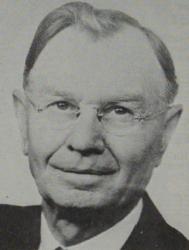Planning worship?
Check out our sister site, ZeteoSearch.org,
for 20+ additional resources related to your search.
- |
User Links
Person Results
J. H. Fillmore

1849 - 1936 Composer of "[Jesus is calling, calling, calling]" in The Majestic Hymnal, number two James Henry Fillmore USA 1849-1936. Born at Cincinnati, OH, he helped support his family by running his father's singing school. He married Annie Eliza McKrell in 1880, and they had five children. After his father's death he and his brothers, Charles and Frederick, founded the Fillmore Brothers Music House in Cincinnati, specializing in publishing religious music. He was also an author, composer, and editor of music, composing hymn tunes, anthems, and cantatas, as well as publishing 20+ Christian songbooks and hymnals. He issued a monthly periodical “The music messsenger”, typically putting in his own hymns before publishing them in hymnbooks. Jessie Brown Pounds, also a hymnist, contributed song lyrics to the Fillmore Music House for 30 years, and many tunes were composed for her lyrics. He was instrumental in the prohibition and temperance efforts of the day. His wife died in 1913, and he took a world tour trip with single daughter, Fred (a church singer), in the early 1920s. He died in Cincinnati. His son, Henry, became a bandmaster/composer.
John Perry
J. H. Fillmore
Palmer Hartsough

1844 - 1932 Author of "Jesus is Calling" in The Majestic Hymnal, number two Rv Palmer Hartsough USA 1844-1932. Born in Redford, MI, he attended Kalamazoo College and Michigan State Normal school (later MSU). He became an author, editor, lyricist, and librettist. After working as a traveling singing teacher in MI, IL, IA, OH, KY and TN, he opened a music studio in Rock Island, IL, around 1877, also directing music at a Baptist church there. In 1893, due to his poetic abilities, he moved to Cincinnati, OH, and joined the Fillmore Music Company, providing texts (over 1000) for their music. He also served as music director at the Bethel Mission and the 9th Street Baptist Church. He became a traveling song evangelist in 1903, and was ordained a Baptist minister in 1906, serving in Ontario, Canada, and MI from 1914 to 1927. He then returned to Plymouth, MI, where he lived the rest of his life. He never married, but was close to his two sisters, and wrote them a weekly letter for many years. With Fillmore Company he helped publish 20 songbooks. He died in Plymouth, MI.
John Perry
Palmer Hartsough
Thomas S. Cobb

1876 - 1942 Person Name: T. S. C. Arr. of "Jesus is Calling" in The New Wonderful Songs for Work and Worship Thomas S. Cobb (1876-1942), a native Texan, was educated in much the same circles as [Austin] Taylor, and received his music diploma from the Western Normal and College of Music in Dallas. He taught singing schools across Texas and the bordering states, and was particularly noted for the "Cobb Quartet" made up of his four daughters. He was recruited to Firm Foundation by Showalter in 1935.(Finley, 122ff.) Cobb edited only four hymnals for Firm Foundation before his death in 1942, but among these was the significant New Wonderful Songs (1933); at 296 hymns it was part of the trend toward more substantial publications.
Prior to his work with Firm Foundation, Cobb edited hymnals for the Quartet Music Company of Fort Worth, Texas. A search of WorldCat.org shows that he was involved with at least 7 books for this publisher, going back as far as the 1890s when it was called the "Quartette Company." One of these earlier works From the Cross to the Crown (1921?) was subtitled, "Scriptural Songs," and was co-edited with Elder T. B. Clark and T. B. Mosley, one of the most well-known singing school teachers among the Churches of Christ in the southeastern U.S. Mosley was also known as a staunch doctrinal conservative. This gives some idea of the bona fides Cobb brought with him during the era of the "hymnal controversy" surrounding E. L. Jorgenson's Great Songs of the Church. Jorgenson was firmly in the premillennial camp, and was an editor of Word and Work, the primary voice of this viewpoint within the Churches of Christ. Opponents of premillennialism objected to several hymns in Great Songs that supported this doctrine, or were at least questionable. (Most of these were removed or altered in the better-known "No. 2" edition).
Thomas S. Cobb passed from this life in 1942, shortly after the last of the pre-war Firm Foundation hymnals appeared.
--drhamrick.blogspot.com/2012/01/hymnals-published-by-firm-foundation.html
Thomas S. Cobb


 My Starred Hymns
My Starred Hymns


